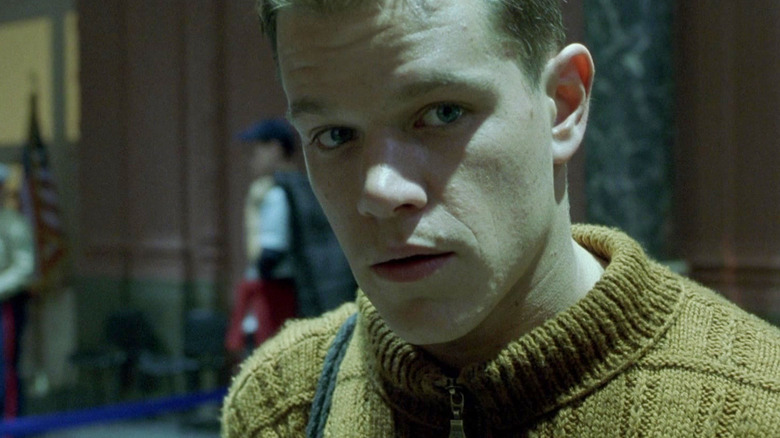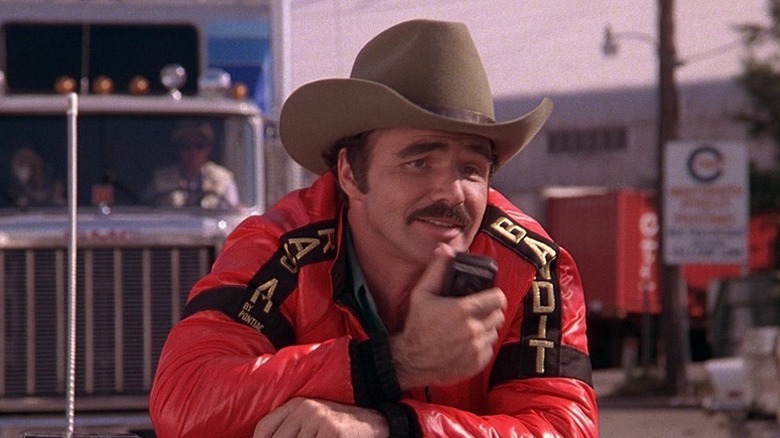The Hollywood Legend Who Almost Played Jason Bourne Before Matt Damon
Burt Reynolds was one of the biggest movie stars in Hollywood at the outset of the 1980s thanks to a decade-long stretch of hits that included "Deliverance" (in a role that almost went to Marlon Brando), "White Lightning," "The Longest Yard," and, of course, "Smokey and the Bandit." He was at his best playing cocksure lawbreakers who thwarted the corrupt or unjust will of stuffy authority figures. He was the best kind of scoundrel.
And yet, like many movie stars, Reynolds got bored with playing something close to the same character picture after picture. So, he attempted to broaden his appeal by appearing as a suave jewel thief in "Rough Cut," a singing sheriff in "The Best Little Whorehouse in Texas," and directing himself as a Dirty Harry-esque cop in "Sharky's Machine." The results were mixed. Having lost all interest in the "Smokey and the Bandit" franchise (which died in 1983 with the mostly Reynolds-less "Smokey and the Bandit Part 3"), the star was at a crossroads. The redneck action-comedies that used to be his box office bread and butter were now out of fashion, while cop thrillers, where tough-talking detectives take down sadistic killers, seemed to be a safe play in the Reagan era.
Reynolds' career nosedived as the '80s wore on, which makes his decision to turn down the title role in an adaptation of Robert Ludlum's spy bestseller "The Bourne Identity" all the more puzzling. The Cold War was still being waged, and James Bond was as popular as ever. Reynolds as an amnesiac CIA agent with remarkable killing skills could've saved him from insipid dreck like "Stick," "Rent-a-Cop," and "Malone." Sadly, it's probably for the best that Reynolds refused the "Bourne" offer, because he would've been paired with a notoriously picky director.
Burt Reynolds was not born to play Bourne
British director Jack Clayton was known for winning streaks. His first four films — "Room at the Top," "The Innocents," "The Pumpkin Eater," and "Our Mother's House" — were critically acclaimed triumphs that earned a total of seven Academy Awards. Alas, Clayton's perfectionism would get him into trouble throughout the rest of his career. He only made four more feature films ("The Great Gatsby," "Something Wicked This Way Comes," "The Lonely Passion of Judith Hearne," and "Memento Mori"), and he often frustrated his collaborators with his intense attention to minuscule details.
"Something Wicked This Way Comes" had just been completed without Clayton's editorial input when it was announced in The New York Times that he would be filming a movie adaptation of Ludlum's "The Bourne Identity" starring Reynolds. Clayton, who was consistently determined to never repeat himself, was certainly in uncharted waters with Ludlum's pulpy spy thriller. He was also courting on-set turmoil by casting Reynolds in the lead. Anyone who knew about the temperaments of these two artists had to be anticipating a rough shoot and, perhaps, a box office fiasco.
We'll never know how this would've worked out, though we're certainly clear on the material's commercial potential in the wake of Universal churning out a string of Bourne blockbusters in the forms of the Matt Damon-starring "The Bourne Identity," "The Bourne Supremacy," "The Bourne Ultimatum," and "Jason Bourne." (The Damon-less "The Bourne Legacy" was a box office under-performer.) Reynolds finally made a critical comeback in 1997 when he played porn auteur Jack Horner in "Boogie Nights" (for which he should've won the Best Supporting Actor Oscar). He never did reconnect with filmgoers as palpably as he did in the 1970s and 1980s, but when he was on top of the world, few exuded star power quite as powerfully as Reynolds.

